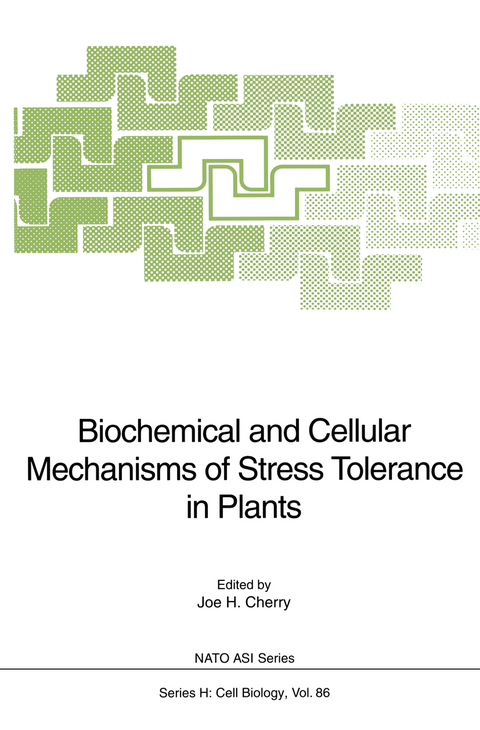
Biochemical and Cellular Mechanisms of Stress Tolerance in Plants
Springer Berlin (Verlag)
978-3-642-79135-2 (ISBN)
Environmental stresses, such as high and low temperature, salinity, and drought, represent limiting factors to agricultural productivity worldwide. Their impact is not only on crops that are presently being cultivated, but they are also significant barriers to the introduction of crop plants into noncultivated areas. The book describes the cellular, biochemical, and molecular mechanisms in plants that regulate tolerance to stresses. Also discussed are prospects of engineering stress-tolerant plants through the modification of germplasm.
1 High Temperature Stress.- The heat stress response as part of the plant stress network: An overview with six tables.- Developmental regulation and enhancement of heat shock gene expression.- Normal cellular protein synthesis and heat shock.- Thermal acclimation and heat stress response of synechocystis PCC6803: The possible role of thylakoid physical state, lipid saturation and molecular chaperones.- Studies of a chloroplast-localized small heat shock protein in arabidopsis.- The low molecular weight heat shock proteins of soybean seedlings.- Class I low molecular weight heat shock proteins in plants: immunological study and thermoprotection against heat denaturation of soluble proteins.- Genetic and molecular evidences of the regulation of gene expression during heat shock in plants.- Integration of acquired thermotolerance within the developmental program of seed reserve mobilization.- Cross protection of one stress by another: strategies in postharvest fruit storage.- Photosynthesis, epicuticular wax and lipid changes in cowpea cultivars grown under hyperthermic conditions.- Altered gene expression in thermoadapted cultured cells of cowpea.- 2 Drought Stress.- Cloning of a DNA fragment encoding ?-glutamyl kinase and ?-glutamyl phosphate reductase from a tomato cDNA library.- Regulation of gene expression in response to drought and osmotic shock.- Gene expression during water stress.- Molecular genetic approaches to improving heat and drought stress tolerance in crop plants.- Evolution and metabolic engineering of osmoprotectant accumulation in higher plants.- Regulation of shoot growth in dry soils by abscisic acid and by root messages.- Stress tolerance in plants: What are we looking for?.- Proteolysis and proteolytic activities in the acclimation to stress: thecase of sugar starvation in maize root tips.- Regulation of the rab17 gene in ABA-deficient and ABA-insensitive viviparous mutants of maize.- A role for sorbitol in desiccation tolerance of developing maize kernels: inference from the properties of maize sorbitol dehydrogenase.- 3 Salinity Stress.- Yeast halotolerance genes: crucial ion transport and metabolic reactions in salt tolerance.- Structure, regulation and function of the osmotin gene.- Responses to salt stress in the halophyte mesembryanthemum crystallinum.- Alterations in H+-ATPase gene expression in response to salt.- Solute regulation by calcium in salt-stressed plants.- The response of plants to salinity: a working hypothesis.- 4 Low Temperature Stress.- Caps, cors, dehydrins, and molecular chaperones: their relationship with low temperature responses in spinach.- Low temperature signal transduction, gene expression, and cold acclimation: multiple roles of low temperature.- Molecular analysis of cold-hardening in barley.- Regulation of low temperature-induced genes during cold acclimation of arabidopsis thaliana.- Genetically engineered modification of plant chilling sensitivity and characterization of cyanobacterial heat shock proteins.- Low temperature regulation of gene expression in winter Brassica napus.- Sorting genes controlling freezing stress resistance: strategy for moving desired traits by merging physiological and genetic approaches.- 5 Engineering Plants for Stress Tolerance.- Engineering plants for stress tolerance via organelle genomes.
| Erscheint lt. Verlag | 22.11.2011 |
|---|---|
| Reihe/Serie | Nato ASI Subseries H: |
| Zusatzinfo | XII, 604 p. |
| Verlagsort | Berlin |
| Sprache | englisch |
| Maße | 155 x 235 mm |
| Gewicht | 928 g |
| Themenwelt | Naturwissenschaften ► Biologie ► Mikrobiologie / Immunologie |
| Naturwissenschaften ► Biologie ► Zellbiologie | |
| Schlagworte | Agriculture • Biotecchnologie • Biotechnology • cellular mechanisms • Environment • Landwirtschaft • Molecular mechanisms • Pflanzen • plants • Stress • Temperature |
| ISBN-10 | 3-642-79135-2 / 3642791352 |
| ISBN-13 | 978-3-642-79135-2 / 9783642791352 |
| Zustand | Neuware |
| Informationen gemäß Produktsicherheitsverordnung (GPSR) | |
| Haben Sie eine Frage zum Produkt? |
aus dem Bereich


